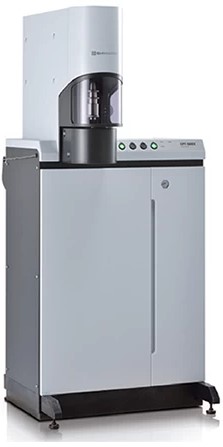Flowtester Capillary Rheometers

The CFT-EX series of instruments are precise and economical instruments used for measuring melt flow rate, shear rate, and viscosity of materials. Samples are heated through a constant heating temperature or a constant heating rate program, and pushed through a die to determine critical processing parameters. Commonly measured materials include thermoplastic resins, rubbers, ceramics, and copying machine toners.

Designed to maximize ease-of-use and safety
The CFT-EX instruments are designed with ease-of-use in mind. Besides providing accurate data, they are engineered to simplify cleaning and reduce exposure to high-temperature surfaces. The rotating furnace allows users to access the furnace so that cleaning at high temperatures can be performed. The cylinder head also rotates outward so that the piston can be easily inserted even when the sample has not fully melted. Users can also swing a front guard into place to prevent disturbances during measurements.
High Pressure Ranges
The weight-set system allows for pressures of up to 50 MPa in .4903 MPa increments (CFT-500EX) or 10 MPa in 0.098 MPa increments (CFT-100EX) to be applied to the samples for better simulation of real-life extrusion parameters. has not fully melted. Users can also swing a front guard into place to prevent disturbances during measurements.
Wide variety of dies and accessories available for a multitude of measurement needs
Besides standard tool steel dies, we offer stainless steel, ultra-hard alloy, and corrosion-resistant dies to ensure that the CFT-EX can withstand your applications. Split dies and T-dies that can be disassembled are also available to reduce the difficulty of cleaning.
The preforming hand press compresses powder samples into an easily-tested pellet that reduces messy sample deposition and data artifacts.
A cooling fan can be attached to the furnace to reduce cooling time and improve productivity.
Software
The CFT-EX software presents an intuitive and elegant interface for setting up runs and monitoring real-time results. Instead of having to click through multiple setup windows, all fields and information needed to configure and perform experiments are presented on a single window. Parameters for either constant temperature or heating rate runs can entered on the left side of the window. Measurements can be started or stopped either from the software buttons or from the instrument itself.
Stroke vs. time is reported in the main window for easy visualization of results as your sample is running. Upon finishing the run, the software automatically populates a table of test results to give the flow rate, shear rate, shear stress, viscosity, position, and melt flow rate.

Detailed post-run analysis can be performed off-line by recalculating stroke positions or temperature ranges to see how relevant parameters vary over the course of the run. Parameters such as viscosity, shear stress, and shear rate can also be graphed as a function of time and temperature. Advanced analyses that take into account pressure losses at the die entrance and exit can be determined using a viscosity correction algorithm based on the Bagley correction.


Specifications
| Test method | Constant test force extrusion using weights | |
|---|---|---|
| Type of tests | Constant temperature method and constant heating rate test | |
| Extruding Pressure Range | CFT-500EX | 0.4903-49.03 MPa (5-500 kgf/cm2). |
| 0.4903 MPa (5 kgf/cm2) step selection | ||
| CFT-100EX | 0.098-9.807 MPa (1-100 kgf/cm2) | |
| 0.098 MPa (1 kgf/cm2) step selection | ||
| Pressure precision | Better than ±1% of the set value | |
| Measuring Range | CFT-500EX | 8 x 10-1 (*1)-1 x 106 (*2) Pa • s |
| CFT-100EX | 1.6 x 10-1 (*1)-2 x 105 (*2) Pa • s 1 x 101 to 1x 106 Pa-s (*1) for 0.5 ID x 1.0 mm length die (*2) for 1.0 ID x 1.0 mm length die |
|
| Heating Method | Electric, 500W | |
| Test temperature | Range | 20 °C above room temperature to 400°C |
| Heat Sensor | Platinum resistance temperature sensor | |
| Measuring Precision Error of Heat Sensor | ±0.3 °C + error of the heat sensor (±0.3 °C + 0.005 °C) | |
| Control Precision | ±0.2°C in stable state | |
| Heating Rate (Constant Heating Rate Tests Only) |
Heating rate 0.5-6.0°C/min, min. 0.1 °C step | |
| Piston Stroke | Effective stroke | 15mm |
| Stroke detector | Linear potentiometer | |
| Measuring precision | ±0.5% (for 15 mm stroke) | |
| Resolution | 0.01mm | |
| Maximum sample size | 1.5cm3 | |
| Piston diameter | 11.282mm (1cm2 in cross sectional area) | |
| Cylinder diameter | 11.329mm | |
| Standard dies (interchangeable) | 0.5 ID x 1.0mm length (tool steel) 1.0 ID x 1.0mm length (tool steel) 1.0 ID x 10.0mm length (stainless steel) 2.095 ID x 8 mm length (stainless steel) |
|
| Operational requirements | Power Source | 100VAC, 50/60Hz, 7A max. |
| Pneumatic Source | About 0.5 MPa (4 kgf/cm2), 15NL/run | |
| Temperature | 10-35°C (below 29°C in wet bulb reading) | |
| Humidity | Humidity 30-80% (No condensation) | |
| Approximate dimensions and weight | Rheometer Main Body | 690 W x 650 D x 1,530 H mm, 160kg |
| Control Computer | Compatible Operating Software | Windows 8.1, Windows 7 (32bit/64bit) |
| Communication Interface | USB 2.0, 1 port | |
| Display | 1280 x 1024 or higher resolution recommended | |
